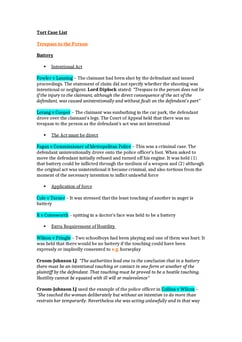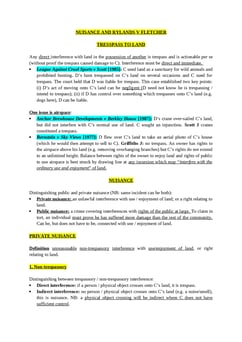Transco plc v Stockport MBC [2004] 2 AC 1
Judgement for the case Transco plc v Stockport MBC
KEY POINTS
The principle established in the case of Rylands v Fletcher should not be abolished. The original reason for this principle was sound, and it continues to be valid.
In the civil law of nuisance, the concept of a public interest defense does not exist. Instead, there is a defense based on the idea of express or implied consent.
To determine if a risk has been caused by an "non-natural" user of land, you can ask whether the damage that occurred is something the landowner could have reasonably anticipated and insured against.
FACTS
Hollow End Towers, a multi-storey block of flats owned by a local authority, experienced a water pipe failure within the building. This pipe, responsible for supplying water to multiple flats, ruptured without any negligence from the council or its agents.
The escaped water ultimately damaged an embankment supporting Transco's high-pressure gas main, posing a significant risk.
Transco promptly undertook costly measures to address the situation and is seeking reimbursement from the council for these expenses.
JUDGEMENT
Appeal dismissed.
COMMENTARY
The Transco ruling sustained the doctrine in Rylands v Fletcher while also noting the necessity for flexibility and nuanced application of the rule in contemporary contexts with intricate infrastructure and potential environmental dangers.
ORIGINAL ANALYSIS
Transco plc (British Gas come commercial) had sued the council for repairs of £93,681.55 underneath one of its pipes in Brinnington. The ground beneath the gas pipe had washed away when the council’s water pipe leaked.
HL denied the claim since the water is not dangerous, and only dangerous, out of the ordinary things come within the Rylands rule.
Lord Bingham
He decided “to retain the [Rylands] rule, while insisting upon its essential nature and purpose. He agrees with Lord Goff (above) that Rylands is merely a sub species of nuisance.
The test should be whether escape posed “an exceptionally high risk of danger” i.e. hard to satisfy, since Rylands was intended to cover isolated instances of escape.
On the “natural” bit from Lord Cairns, he says the correct test is whether Defendant acted as an “ordinary user” rather than question whether the thing was done naturally, which is vague.
He also says the “reasonable user” principle is unhelpful. Only a non-ordinary user can attract liability under Rylands. Is it something Defendant did or ought to have recognised as something quite out of the ordinary at the time it was done.
An occupier of land who can show that another occupier of land has brought or kept on his land an exceptionally dangerous or mischievous thing in extraordinary or unusual circumstances is … entitled to recover compensation from that occupier for any damage caused to his property interest by the escape of that thing, subject to defences of act of God or of a stranger, without the need to prove negligence.
Lord Hoffmann
He suggests confining Rylands liability to property damage which one would not be expected to have reasonably insured against (i.e. an increased risk).
This is to encourage people to make use of relatively cheap land insurance rather than seek to place their loss on others by litigation.
-
In this case this was the sort of risk that Plaintiff ought to have reasonably insured against and therefore it does not come within the Rylands rule.
NB Hoffmann is alone in using insurance as a guideline.
Lord Scott
He says that a use is ‘non-natural’ if the escaped substance is not naturally found on the land.
Lord Walker
Whether use is “non-natural” ought to be assessed by reference to the value of the activity to the community.
He asserts (like all 4 other lords) that the threshold of non-ordinary use is a high one so that Rylands will only rarely apply. Negligence cannot replace Rylands since courts would stretch negligence by a desire to find liability.
He says that since Rylands now has a small scope due to environmental regulations it would be unharmful to leave it in existence
RELATED CASES
For Further Study on Transco plc v Stockport MBC
Need instant answers? Our AI exam tutor is here to help.
Ask questions 🙋 Get answers 📔 It's simple 👁️👄👁️
Our AI is educated by the highest scoring students across all subjects and schools. Join hundreds of your peers today.
Get StartedSimilar Cases
Related Product Samples
These product samples contain the same concepts we cover in this case.
| Tort Law | Nuisance Notes (70 pages) |
| GDL Tort Law | Rylands And Fletcher Notes (5 pages) |
| GDL Tort Law | Tort Of Rylands V Fletcher Notes (4 pages) |


